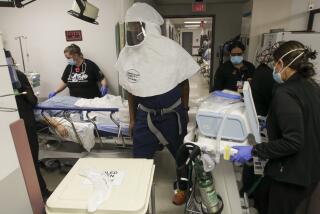Panel Opposes Restricting Health Workers With AIDS : Policy: No scientific reason for limits, commission says in proposing guidelines to prevent transmission.
WASHINGTON — There is no medical or scientific justification for restricting the practice of AIDS-infected health care professionals, nor should they be forced to tell their patients that they carry the virus, the National Commission on AIDS said Thursday.
The commission also opposed mandatory AIDS-testing of health workers, urging instead that any such testing be voluntary.
The best way to prevent transmission of the virus by health care workers is through strict adherence to normal infection-control procedures, the commission said, adding that “no effort should be spared” to ensure that all health-care professionals are trained in and apply so-called universal precautions.
The proposals were contained in a report intended to help states develop policies to deal with surgeons, dentists and other health care professionals who have AIDS or are infected with the human immunodeficiency virus. A new law passed by Congress last year requires states to develop such policies by Oct. 28 or risk losing federal funds for public health programs.
“I think this is a careful, science-based report, and it is my fond hope that states will follow these recommendations as we have outlined them,” said Dr. David E. Rogers, vice chairman of the commission.
The law arose from the case of an AIDS-infected Florida dentist, Dr. David Acer, who apparently infected five patients, including Kimberly Bergalis, a young woman who became the symbol of the ultimate AIDS “innocent victim.” Until her death from AIDS last December, she crusaded for mandatory testing of health professionals and for severe professional restrictions against those who were infected.
The law requires states to develop guidelines similar or “equivalent” to those issued by the federal Centers for Disease Control, which must approve the state plans. Usually, health-policy guidelines issued by the federal government are voluntary and states typically use them as a road map to develop their own public-health rules.
But the issue of HIV transmission between infected doctors and patients has been an unusually emotional one, prompting Congress to become involved.
Originally, the CDC issued far more restrictive recommendations. Among them was a requirement that health officials draw up a list of surgical procedures believed to carry the greatest risk of transmission, and another that physicians inform patients that they were infected. Later, based on new information, the CDC attempted to ease the proposals.
Among other things, “look back” studies of more than 15,000 patients of 32 HIV-infected health care workers showed no additional instances of physician-to-patient transmission. The Florida case remains the only such known episode.
But the agency was rebuffed in its attempt to relax the proposals by officials at the Department of Health and Human Services, who said they were concerned that the revised guidelines had violated the will of Congress. Others charged that the decision to drop the guidelines was politically motivated.
Officially, the more restrictive guidelines remain in place, meaning states could prohibit AIDS-infected physicians from performing certain procedures and could require them to tell their patients about their HIV status. However, CDC officials have indicated they will be flexible in reviewing state policies.
The CDC said it had no comment on the commission’s report.
“All decisions in public health have to be made as rationally as possible,” said Dr. June Osborn, who heads the commission. “The initial public response of wanting zero risk was an understandable one, but an irrational one. This is not a world in which zero risk can be achieved by any means.”
Furthermore, the commission said tougher restrictions could also result in a refusal by health professionals to care for AIDS patients.
The 15-member commission is an independent body created by federal statute to advise Congress and the President on AIDS policy. Its members are appointed by Congress and the White House.
In another AIDS-related development, the CDC announced Thursday that it would meet later this month with other federal officials--including those from the National Institutes of Health--and non-governmental scientists to review the mysterious cases of patients who have AIDS-like diseases but test negative for HIV.
“We want to share information,” said Dr. James Curran of the CDC. “We want to get all the people who know something to share their information. . . . It’s a sort of mobilization meeting.”
During last week’s eighth International Conference on AIDS in Amsterdam, reports of more than two dozen such cases raised the possibility that a new and as yet undetectable virus might be responsible for the illnesses.
More to Read
Sign up for Essential California
The most important California stories and recommendations in your inbox every morning.
You may occasionally receive promotional content from the Los Angeles Times.










